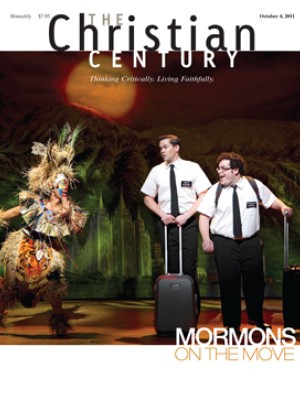Catholics tune out bishops’ voting guides
Every four years, the U.S. Catholic bishops publish a detailed
statement about how Catholics should think about key political issues in
light of church teachings. And every election cycle, activists on both
sides of the Catholic political spectrum argue passionately about what
the statement really means, whether it supports their position and why
it needs to be overhauled if it doesn't.
But what if nobody
actually reads it? A new poll of U.S. Catholics shows that just 16
percent have ever heard of the bishops' document, "Forming Consciences
for Faithful Citizenship," and just 3 percent say they have read it.
Most
worrisome for the bishops may be that three-quarters of those who were
even aware of "Faithful Citizenship" say the document had "no influence
at all" on the way they voted in 2008; 71 percent said it would have
made no difference even if they had known about it.
Read our latest issue or browse back issues.
Overall, just 4
percent of adult U.S. Catholics say the statement from the U.S.
hierarchy either was a major influence, or would have been if they'd
known about it.
"Those who think the bishops have too much
influence on Catholic voters may be relieved by these findings," said
Peter Steinfels, codirector of Fordham University's Center on Religion
and Culture, which sponsored the survey. "Those who think that the
bishops have too little influence or have influence of the wrong sort
may be distressed."
Steinfels presented the poll findings at a
conference September 6 at Fordham's Manhattan campus which featured John
Carr, a longtime staffer at the U.S. Conference of Catholic Bishops who
has worked on "Faithful Citizenship" for the past 35 years. Also
participating were Robert George, a leading conservative Catholic
intellectual from Princeton University, and Stephen Schneck, director of
the Institute for Policy Research and Catholic Studies at the Catholic
University and an influential liberal Catholic supporter of the Obama
administration.
American Catholics are the ultimate swing voters,
switching between Republican and Democrat alike. Representing
approximately one in four U.S. voters, Catholics make up the largest
single religious voting bloc in American politics.
Carr said
"Faithful Citizenship" has never been an actual voter guide like those
put out by interest groups hoping to steer voters toward one candidate
or another. In recent years, and most notably in the 2008 version, the
36-page document has focused increasingly on the larger principles at
stake in elections and how Catholic voters should exercise "prudential
judgments" in choosing how to vote when none of the options is ideal.
Conservatives,
however, have complained that such language is too vague and that the
bishops should be more direct in telling Catholic voters that they
cannot vote, for example, for a candidate who supports abortion rights.
Deal
Hudson, president of Catholic Advocate and an adviser to Republicans on
lobbying Catholic voters, is pressing the bishops to sharpen the
language in "Faithful Citizenship" when they gather in November to vote
on the statement.
"If the bishops republish the 2008 version of
'Faithful Citizenship' for the 2012 election—without changes—they will
be providing Catholic voters another carte blanche to cast their vote
for any proabortion candidate they want," Hudson and Catholic Advocate
vice president Matt Smith wrote in an open letter to the hierarchy.
Observers say the bishops are unlikely to make substantial changes to "Faithful Citizenship" when they meet in November.
The
status quo, however, may not please many liberals either. They often
complain that the statement's focus on opposing abortion rights and
same-sex marriage can provide an escape hatch for conservative Catholics
who don't want to take into account other church teachings about caring
for the needy, welcoming immigrants and providing adequate health care
for all.
Whether any document could make a difference—even if more Catholic voters heard about it or read it—is an open question.
Catholics
have gone from being a solid Democratic bloc in the days of John F.
Kennedy (the first and only Catholic president) to a swing vote whose
members are numerous enough to mean the margin of victory in key
battleground states.
Catholic demographics are changing, too, and
each group within the church—from blue-collar whites to immigrant
Latinos—has a different agenda. Moreover, the transformation is
happening at a time when economic concerns trump all other issues.
All
of which leaves Catholic voters as divided as any other segment of the
American people. Carr opened the Fordham event by saying he was just
happy to be out of Washington—"a more polarized, dispirited place you
can't imagine." But, he added, "that polarization is creeping into our
ecclesial life, I'm afraid." —RNS






